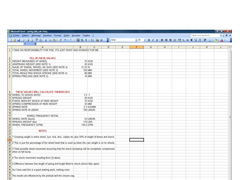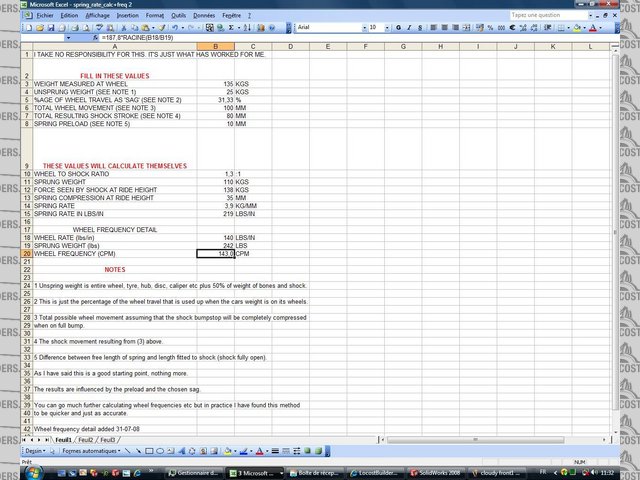cloudy
|
| posted on 4/2/09 at 10:05 PM |

|
|
Please sanity check my spring choice!
I've fed my values into the spring calculator spreadsheet floating around here,
rear of the car totals 225kg
front of the car totals 110kgm (with fluids, no fuel)
It's recommending 190lbs rear and 110 front
I can only buy a 180 or a 200 for the rear, 110 is available for the front however...
Rear shock to wheel movement is 0.8
Rear front to wheel movement is 0.66
The front shock is mounted about 60% down the wishbone, whereas the rear is mounted to the upright...
Can anyone suggest whether these are sensible? I'd like a semi race setup, that will not be dangerous/massively uncomfortable on the road...
I have 130lbs all round at the moment, which seems a bit weak at the rear... But as it's in build I dont know how it performs on the road....
[Edited on 4/2/09 by cloudy]
www.warnercars.com
|
|
|
|
|
Andy S
|
| posted on 4/2/09 at 11:21 PM |

|
|
Don't forget to factor typical fuel and the driver weight into your calculations as well as any reductions in the spring rate due to the angle
of the shock
As the drive weight is a considerable part of your cars weight its especially important.
And dont forget you are only calculating for the sprung weight not the unsprung so remember to remove wheels tyres and half of the suspension
component from the calculation - Its then easy to see how the driver is maybe 30% of the cars mass
Andrew
[Edited on 4/2/09 by Andy S]
|
|
|
cloudy
|
| posted on 4/2/09 at 11:29 PM |

|
|
The spreadsheet compensates for unsprung weight, not sure about driver or fuel weights, it might do those too - can anyone comment?
www.warnercars.com
|
|
|
Kaspa
|
| posted on 5/2/09 at 01:11 AM |

|
|
Cloudy, mate are you sure about the weight thats a total of only 335 kg god if your right that fantastic, a bit of advice on springs , avoid over
springing , beleive it or not softer is quicker than harder, and remember the shock is there to control the spring not the other way around, around
200lb for the rear will be a good starting point, you may find you might have to go up a little but a good shock will be your best freind there, same
senario applies to the front according to my calcs somewhere in the region of 125lb
the other sugestion is what i have just done to my 7, as i was badly over sprung, and that was to get some progessive springs wound up, and they work
brilliantly ,giving a comfortable ride on the road , and great handling on the track
just a thought
cheers Kaspa
[Edited on 5/2/09 by Kaspa]
understeer= when you hit the wall front first
oversteer=when you hit the wall back first
HP= how fast you hit the wall
Torque= how far the wall moves when you hit it
|
|
|
MikeCapon
|
| posted on 5/2/09 at 07:18 AM |

|
|
Morning James,
The spreadsheet will not add driver weight, passenger weight, fuel weight or any other kind of weight. What you need to enter in the appropriate boxes
is the real weight that will be there when the car is used so include all these if you need them.
If you wish, send me your filled in spreadsheets and I'll check as best I can. Or we can do it on open forum if you prefer. I don't mind
either way.
|
|
|
cloudy
|
| posted on 5/2/09 at 08:43 AM |

|
|
OK with 75kg driver and 10 litres of fuel, that's given 240 lbs rear 140 front
I'm tempted to go therefore 130 front and 210 rear - sound ok?
www.warnercars.com
|
|
|
MikeCapon
|
| posted on 5/2/09 at 09:18 AM |

|
|
Hi James,
I can't tell you with that little information. I'll need to see the filled in spreadsheets. Either mail them or post them on here if you
want.
Cheers,
Mike
ETA mike"dot"capon"at"orange"dot"fr
[Edited on 5/2/09 by MikeCapon]
|
|
|
cloudy
|
| posted on 5/2/09 at 09:29 AM |

|
|
REAR
WEIGHT MEASURED AT WHEEL 135 KGS
UNSPRUNG WEIGHT (SEE NOTE 1) 25 KGS
%AGE OF WHEEL TRAVEL AS 'SAG' (SEE NOTE 2) 31.33 %
TOTAL WHEEL MOVEMENT (SEE NOTE 3) 100 MM
TOTAL RESULTING SHOCK STROKE (SEE NOTE 4) 80 MM
SPRING PRELOAD (SEE NOTE 5) 10 MM
FRONT
WEIGHT MEASURED AT WHEEL 75 KGS
UNSPRUNG WEIGHT (SEE NOTE 1) 25 KGS
%AGE OF WHEEL TRAVEL AS 'SAG' (SEE NOTE 2) 31.33 %
TOTAL WHEEL MOVEMENT (SEE NOTE 3) 120 MM
TOTAL RESULTING SHOCK STROKE (SEE NOTE 4) 80 MM
SPRING PRELOAD (SEE NOTE 5) 10 MM
www.warnercars.com
|
|
|
MikeCapon
|
| posted on 5/2/09 at 10:24 AM |

|
|
James, I'm working on a reply for you at the same time as some other stuff. Bear with me please......
|
|
|
MikeCapon
|
| posted on 5/2/09 at 11:04 AM |

|
|
Hi James,
Using your figures gives me these two spreadsheets.
And before the Big Image Police arrive I'm sorry but reducing the image size bu%%ers the text.
Front
 
cl ft
Rear
 
cl rr
Now the inevitable questions.
B5 %age of wheel movement used as sag. Where did you get this figure from? IIRC it is the figure that was already in the spreadsheet having been
entered by the previous user.
You need to decide what ride height you want and adjust this figure accordingly. The best way to work this out is to sit the car on a pair of
jacks and drop/lift it to the position you
would like to see as the 'normal' ride height. If the car has a flat bottom this should normally be lower (say 20-40mm) at the front. Then
measure how much of the wheel movement
is used up. For a road/track car without aero 25-33% is pretty standard.
Once the ride height is dealt with then you need to have alook at the wheel frequencies. The ones showing at the moment are very high. As a guide,
road cars go from 60-80 CPM,
firmer sports cars from 80-100 CPM and non aero race cars from 100-125 CPM. If you want a car that remains usable but firm on the road and that can
handle a track day well aim for
100-110 CPM.
You can alter the CPM by changing the preload (B8). More preload drops the CPM and the spring rate.
Hope this makes sense and helps you. Let us see what you come up with.
Cheers,
Mike
|
|
|
cloudy
|
| posted on 5/2/09 at 11:13 AM |

|
|
Thanks Mike, some great info - I will adjust accordingly - the 31.33% I left as it's pretty close to how I need it...
James
www.warnercars.com
|
|
|
pocket rocket
|
| posted on 5/2/09 at 11:47 AM |

|
|
hi guys,
sorry to be dumb but could someone quickly explain sprung and un-sprung weight to me 
every days a school day 
|
|
|
MikeCapon
|
| posted on 5/2/09 at 12:11 PM |

|
|
Sprung weight is the weight of everything that is actually supported by the springs.
Unsprung weight is the weight of those other components between the spring and the road.
When you move the wheel up and down, everything that moves at the same time (including the wheel) is unsprung.
|
|
|













